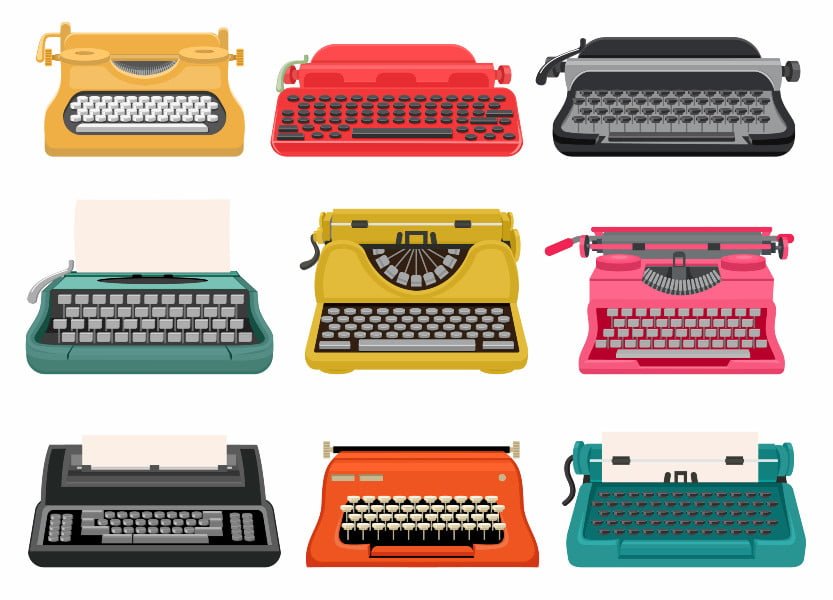All writers have different writing styles – whether that means what they write, how they write, or the way they approach their writing.
It’s always fascinated me how the English language is made up of simply twenty-six letters arranged into more than 171,500 words, all of which we use to express thoughts, ideas and emotions. Every piece of literature, from ad copy to Shakespeare, is made up of that!
But how you choose to combine those letters to express information to an audience is what matters, and is entirely unique. That’s why no two books are the same, and no two writers are either.
If you’re asking yourself ‘How many types of writers are there? And which am I?’ then you’re at the right place!
In this article, I will shed light on the different types of writing out there, as well as the different writing personalities you might come across. Hopefully, you will find one you identify with and can use the tips in this article to embrace your own unique style.
Different Kinds Of Writers
As a child, I remember telling my careers advisor ‘I want to be a writer’. All I knew at the time was that I wanted to use words. I wanted to tangle them up, mix them around and find new ways to express myself. Descriptive writing, scientific writing, creative writing – it didn’t matter to me, I just had a lot to say!
There are four main categories of writing styles: expository writing (explaining something), descriptive writing (whether fiction or non-fiction), persuasive writing (as in copywriters for advertising agencies or journalists for certain press) or storytelling.
If, like me, you’ve always known you want to write but have no idea what kind of writing jobs exist, then take a look at the list below where I will be discussing authors (both fiction and non-fiction), technical writing, what it means to be a blog writer (like I’m doing right now), and lots of other avenues writers choose to take.
Let’s start with storytelling…
Fiction Writers
Creative writing isn’t a vocation that always guarantees a full-time wage (at least, not to begin with), but it is very rewarding, plus it’s a great way to build your writing skills. Being an author often involves conjuring up the five senses, lots of narrative writing and descriptive writing – it’s describing something that isn’t real. In short, creative minds love nothing more than inventing new worlds.
Some authors write novels and short stories, while others prefer flash fiction and poetry – and most dream of one day becoming published.
If this is the kind of writing that makes your heart flutter, take a look at our many articles on how to get published, along with lots of examples of what it takes to become a fiction author.
Non-Fiction Writers
When it comes to non-fiction you can choose to be a technical writer (ie content creation, such as this article and blog post) or a non-fiction creative writer – but either way, what you’re writing about is not made up.
Non-fiction writing suits those who love research as it’s based on facts (no made-up stories).
Instead of starting with a ‘what if…’ question, most start with a ‘why…’ question. The goal is to teach and inform.
For authors, this includes how-to books, self-help books, historical tomes, scientific or academic books, political biographies, and even memoirs. Instead of wanting to write books, other writers may prefer to submit articles to publications or run their own blogs, which may cover writing on current events, first-hand accounts or business writing.
Either way, this type of writing (like fiction writing) often means planning and writing your work before knowing whether it will get published (or make you any money).
So if it’s writing as a full-time career you are after, then that leads us on to…
Professional Writers
All writers work, but by ‘professional’ I mean a guaranteed, regular income that comes solely from your writing.
If you want a job that pays you to put pen to paper, then you may choose to become an investigative journalist, copywriter or work in marketing. Although this does mean studying the professions, because none of these are jobs you can easily fall into.
Freelance writers, on the other hand, are employed on an ad-hoc basis to create content such as this article. It’s a fun way to find your feet as you get to try out various types of writing, reporting on various subjects, and in various writing styles. It’s less about qualifications and more about building up a decent portfolio.
Full-time employed copywriters are similar to the above but employed by a business or agency, writing everything from advertising and marketing copy to specialising in business or technical writing.
Writing for business may not be as much fun as spending all day in your PJs conjuring up plots about dragons and mystical lands, but it does guarantee a regular wage (which is why many authors manage to do both types of writing side by side until their books take off).
Other Types Of Expressive Writing Styles
Fiction, non-fiction, and technical writing are not the only styles of writing you can explore. There are so many more. Each of them tend to follow their own structure, have their own rules and certainly have their own audience. If you haven’t found a style that suits you yet, why not explore a few of the following creative ways to express yourself?
- Playwright
- Songwriter
- Screenplay writer
- Comics/Manga/Graphic novels
- Radio plays
Even though each of these unique crafts takes skill, practise and perseverance, unlike being a professional writer there’s nothing stopping you from taking an online course and having a go. Investigative journalists don’t leave university and walk straight into a top job at The New York Times, but many creative writers have accidentally fallen into their area of expertise and made it work.
There are no rules about picking just one type of writing style or job and sticking to it. Try them all and see where you end up.
It’s not just what you write about that’s important. With so many different writing styles and approaches out there, it’s also important to understand what kind of writer you are.
So let’s take a look…

Finding Your Writing Style
It’s important to point out that there’s no right or wrong way to be a successful writer. With technical writing there are usually brand guidelines to stick to and an audience to consider. But in fiction, although there may be guidelines within each genre and sub-genre, the longer you work on your craft the more you understand that those rules are there to be challenged, bent, sometimes even broken.
Finding a writing style to suit you means finding what works for you. Yet how are you able to know what works if you’ve yet to put a single word down on paper? Or perhaps you have but it’s not going as planned.
Each writer is different in terms of how much time they have, how much energy, experience and even how their mind works. Here are some ways to approach writing and find a style that works for you!
Trial And Error
The only way to know if you have the time or the tenacity to be the type of writer you want to be is to have a go. It’s that simple.
Take a look at all the styles in this article and set yourself a task – offer to pen an article for your favourite blog, come up with a song, enter a short story competition. What do you have to lose? Try different areas of writing and see what feels natural to you. See where your voice feels most comfortable and what you enjoy the most.
You don’t even have to tell anyone, it can be your own private passion until you’re ready to make it your own.
Read. A Lot! And Widely
The very best piece of advice I was given as an aspiring author was “read often”. Explore different styles of writing and see what sparks your interest and what engages you as a reader. This doesn’t only apply to creative writing but also to non-fiction and journalism.
Devour as much as you can, make notes, read books on becoming a writer, and keep learning.
Work To Your Strengths/Embrace Your Voice
Most of us will know instinctively what we enjoy writing. If you know, you know. And whatever style that is, it’s ok! You don’t need to change who you are to fit into a box that doesn’t feel right for you.
If you write novels, and you don’t enjoy writing short stories, that’s ok. Maybe you know you have a great story inside you, but you simply don’t want to write a whole 90,000 word novel; in which case, try writing shorter novellas.
All writing is creative. It’s art. It will always find an audience no matter how niche. Don’t get stuck on narrative style or a specific purpose, or what the publishing industry and your favourite authors are doing, just write and see what happens.
Once you have decided which style of writing suits you, and you can hear your author voice, the next step is to truly understand, embrace and enjoy the type of scribe you are.

What Kind Of Writer Are You?
Just as there are many types of books and ways to express yourself, there are also many types of writers. How you approach your work influences what you write, how long it takes, and how hard you will find it. For now, I’m going to focus on fiction.
Below is a list of personalities I have come across in my time. You may well find yourself here – you might not. Many writers are a combination of more than one type of personality, and like a writer’s work and their readers, other authors find that they’ve approached each one of their books in a different way.
So what’s your personality type? Here’s an example (or eleven).
Writing Personalities
Planner/Intense Plotter
You know exactly what you’re doing. You know exactly what you’re writing, how long it needs to be and what needs to be included in each chapter, because you’ve spent weeks (or even months) plotting every scene. Your office is covered in sticky notes. If you get a block, you turn to that 10,000 word outline you created before you wrote a single page of the novel or the character profiles you drew up before you worked out your beats.
You might still have wobbles, but you know how to get back on track. You work on one novel at a time and until it’s polished, then you take those sticky notes down and start all over again.
Pantser
The opposite of a planner, you fly by the seat of your pants and love it. You use the freedom of no rules and no structure to let the characters tell their story and delight in the surprises that arrive on the page when people in your head suddenly do something you didn’t see coming. You embrace the ‘dirty first draft’ and expect to wrangle the story out of the arms of those wild voices and turn their bizarre exploits into an understandable plot. You start with a rough idea and let your imagination do the rest. Structure and beats can wait, that all comes in the edit.
Turtle
Slow and steady wins the race, right? As a turtle writer, you often feel intimidated by those who seem to be able to sit at their desk and churn out chapter after chapter. You, however, take your time. Every word has its moment to shine. You might not write in great quantities, but quality counts. It can, and often does, mean your edits don’t take as long, because you polish as you go, but by the time the pantser has wrangled their characters into shape, the turtle will be right there with them at the finish line.
Magpie
You never ignore a voice when it speaks. Your notebooks are filled to the brim with ideas and half-written chapters, sometimes even a detailed synopsis. You have Pinterest boards for your settings and a mood board per scene. You could be deep in a first draft and a new idea will pop up, which you embrace, make a note of, then set aside to percolate. It may mean your first drafts take longer to complete, but at least you know once you are finished, you have a million books to choose from to work on next. Be careful though magpie, you can very easily turn into an eternal procrastinator.
Speed Demon
You write fast and furiously. As soon as you sit in your chair, you know you won’t leave until all the words in your head are on the page. But it can be exhausting. You may feel depleted at the end of the day, but that’s fine, as you will take the down days in between writing days to find inspiration and fill that creative well again ready for your next writing sprint. You may need to learn to embrace the lulls as well as the sprints to make the most of this writing personality.
NaNoWriMo-er
You love nothing more than a deadline, and a cheerleading squad behind you gives you the push to get through the slow days. That’s why NaNoWriMo is perfect for you. The constant accountability means you can’t procrastinate. You know that writing an entire novel in a month will mean a very dirty first draft, but you also know you will have something to edit at the end of the month and embrace that.
One Hit Wonder
You’ve written a book that means the world to you. This book is destined to be your bestseller and you’re not prepared to accept anything less than your very best work. You work, and rework that book because you know you will see perfection on the page when it’s finally finished. You won’t hear the constant chatter of ‘move on’ because you know your end goal and that is all that matters. But be careful, because no book is ever truly finished, and if you can write one good book you can create another… so don’t take too long!
The Eternal Procrastinator
You know you should sit your bum in the chair and write all the words. Every single self-help book you’ve ever read says you “can’t edit an empty page”. No matter how many times you shout at yourself to sit down and write the damn book,the doom scrolling on Twitter is just too tempting. Doing short bursts of writing, often with an accountability buddy, may help you get out of the eternal cycle of procrastination. The eternal procrastinator has a tendency to slip into the Magpie category too – so be careful, because all that glitters isn’t gold.
The Happy Murderer
You love nothing more than ‘killing your babies’, getting a real thrill out of over-writing your first draft and then taking the axe that is the red pen and cutting out thousands of words at a time. You know you may lose a character or a whole scene, but that’s the thrill. Seeing all the words on the page and then cutting them down to only those that are necessary gives you a buzz. You’re the writer that prefers to edit. Life is tough, and so is writing, so you spare no feelings and are ruthless with your work. After all, if you want a perfect book, you have to be discerning with what you put on the page, right?
Multitasker
Why work on one book when you can work on two, or three? Life is too short to focus on one story at a time and you have many to tell. You’re only happy when you’re editing one book, polishing another and plotting a new one, all at the same time as writing a first draft. You have no issue hopping between worlds to keep things fresh. but beware, you may exhaust yourself easily or become too distracted to finish any project in a timely manner.
Secret Keeper/Dark Horse
No one knows you are writing the next best-seller. You work away silently in the shadows hoping to emerge with a beautifully polished novel and surprise everyone with your ‘overnight’ book deal.
You don’t need or want the opinions of others. You know what you want to write and you don’t want to muddy your mind with other people’s thoughts. Also, no one knowing about your secret project means there are no expectations, no time constraints, and no deadlines. You’re entirely self-motivated. Just remember that the story you’re writing for yourself will only ever live if you do eventually share it… so don’t bottle it up once the time is right.
All Writers Are Unique
Did I convince you? Have you recognised yourself in any of these personality types? Or are you a mix of more than one?
As writers we are creatives. As creatives, we buck the trends and rebel against the world to make sense of it using words. There’s no true way to write a book. No one personality that suits being a writer and no rules that can’t be bent or broken.
Instead, use this article as a framework to understand that there are a million ways you can approach writing and none of them are wrong.
Writing should, at its core, always be enjoyable. If you’re finding it a chore, try a different style (write short bursts of poetry or short stories to flex your writing muscles). Challenge yourself!
Or, take a look at the different personality types and try a different method. If you’re a pantser but you’re struggling to just go with the flow, try some planning techniques to break away from the norm – or do some freestyle writing to free your muse.
Each book, each piece of writing, and each creator is unique. Embrace that and have fun getting to know the writer inside of you waiting to show the world what you can offer!
Jericho Writers is a global membership group for writers, providing everything you need to get published. Keep up with our news, membership offers, and updates by signing up to our newsletter. For more writing articles, take a look at our blog page.











